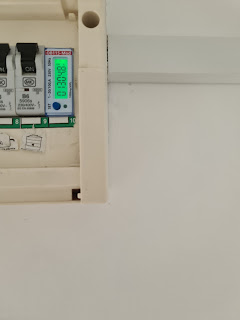I had a problem with my Givenergy Inverter and I thought I would share my solution as I could not see anything about it online.
It wasn't a huge problem, but it was a little annoying when you are an energy geek like me.
Essentially, the inverter stopped providing data to the cloud and therefore I could not see what was happening on my givenergy webpage or the phone app.
It was disconcerting as I could not see what was happening and whether the battery and solar were working or not, let alone how they were performing. For all I knew they had shut down and it might have been dangerous.
What caused the error?
I think the error occurred when I turned off the lighting circuit next to this one in order to change some lightbulbs (see photo).
I later realised that I wasn't getting any readings from the inverter.
What form did the error take?
There was no data being received about the energy going in and out of the meter.
Looking into the reports on the web portal, there was a new error "Electricity Meter Com Fail."
The inverter lights were on, which was reassuring, but the circle of light in the middle was yellowish, which I later learned indicates a communication problem.
I could not see any advice about how to fix this issue online and so I tried a few things.
Eventually I went to bed defeated as it was nearly 1am and I wasn't getting anywhere.
In the morning I continued to look up the problem and what it might be.
Simple solution
I believe I solved the problem by doing the following:
- Pressing the set button on the electronic meter in the consumer unit. I did this last night and it did not achieve anything.
- However, today I also held down the button for a few seconds. This seemed to get the device to go through some sort of process and afterwards the readings resumed.
So there you go - as simple as pressing the button on there to get it to reset itself.
Phew!
So the system was seemingly working throughout. I only missed about 18 hours of data collection on the solar generation and grid import/export but the electricity company will have been measuring my import and export so the data is just for my own records.
However, it was quite a worry that there was a problem with the system over the weekend and that I might have to contact givenergy or my installer to get advice, possibly facing a callout charge or something.
All in all, it has worked out fine, but I wanted to save others the stress by suggesting what might be a simple solution to a frustrating and disconcerting issue.


